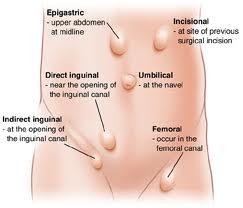Inguinal Hernias Causes, Symptoms, Diagnosis and Treatment

What is Inguinal Hernias?
An inguinal hernia is a protrusion of abdominal-cavity contents through the inguinal canal.
An inguinal hernia occurs when tissue pushes through a weak spot in the groin muscle. This causes a bulge in the groin or scrotum. The bulge may hurt or burn.
Many people don’t seek treatment for this type of hernia because it may not cause any symptoms. Prompt medical treatment can help prevent further protrusion and discomfort.
Causes of Inguinal Hernias:
Some inguinal hernias have no apparent cause.
Others can be caused by:
- Increased pressure within the abdomen
- A pre-existing weak spot in the abdominal wall
- A combination of increased pressure within the abdomen and a pre-existing weak spot in the abdominal wall
- Straining during bowel movements or urination
- Heavy lifting
- Fluid in the abdomen (ascites)
- Pregnancy
- Excess weight
- Chronic coughing or sneezing
The following factors increase the risk of developing inguinal hernia:
- Being male.
- Males are more likely to develop inguinal hernia than females.
- Family history.
- Having a close relative, such as a parent or sibling, who has the condition, increases the chances of one getting it.
- Certain medical conditions.
- People who have cystic fibrosis, a life-threatening condition that causes severe lung damage and often a chronic cough, are more likely to develop an inguinal hernia.
- Chronic cough.
- A chronic cough, such as from smoking, increases the risk of inguinal hernia.
- Chronic constipation.
- Straining during bowel movements is a common cause of inguinal hernias.
- Excess weight.
- Being moderately to severely overweight puts extra pressure on the abdomen.
- This can both weaken the abdominal muscles and cause increased pressure inside the abdomen.
- Certain occupations.
- Having a job that requires standing for long periods or doing heavy physical labor increases risk of developing an inguinal hernia.
- Premature birth.
- History of hernias.
Symptoms of Inguinal Hernias:
Signs and symptoms of inguinal hernia may include:
- A bulge in the area on either side of the pubic bone
- A burning, gurgling or aching sensation at the bulge
- Pain or discomfort in the groin, especially when bending over, coughing or lifting
- A heavy or dragging sensation in the groin
- Weakness or pressure in the groin
- Occasionally, pain and swelling around the testicles when the protruding intestine descends into the scrotum
- Nausea, vomiting or both
- Fever
- Rapid heart rate
- Sudden pain that quickly intensifies
- A hernia bulge that turns red, purple or dark
Diagnosis of Inguinal Hernias:
Inguinal hernia is solely diagnosed on the basis of a physical examination.
The doctor is likely to ask about the patient’s signs and symptoms and to check for a bulge in the groin area.
Because standing and coughing can make a hernia more prominent, one may be asked to stand up and cough or strain as part of the exam.
Treatment of inguinal hernia:
If the hernia is small and not a cause of distress, a doctor may recommend a watch and wait approach.
However, if the hernia is large and painful, the following surgeries can be performed.
- Open hernia surgery
- Laparoscopy
By : Natural Health News




